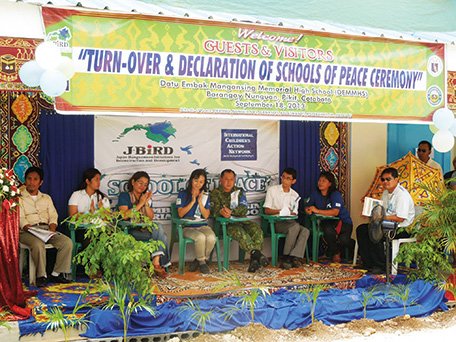(1) Mindanao Peace Process
The conflict between the Government of the Philippines and Islamic rebel groups continued for 40 years in the Mindanao region in southern Philippines. To put an end to this history, the government and the Moro Islamic Liberation Front (MILF) engaged in peace talks from 2001. On March 27, 2014, a comprehensive peace agreement was signed between the two parties, marking a large step forward towards fundamentally resolving the Mindanao conflict.
Under this agreement, during the transition process until the inauguration of the new autonomous government (Bangsamoro(Note 19)) in 2016, the Bangsamoro Basic Law is to be enacted, a referendum is to be held, and a transitional governing entity is to be established. At the same time, various processes that are expected to contribute to the “normalization” of the situation have to be implemented smoothly, including the disarmament of MILF forces, the social reintegration of combatants, the dismantlement of the many private armed groups in the area, the restoration of security by creating a new police organization, and the promotion of socioeconomic development which has lagged behind due to the conflict.
The steady execution of the peace agreement and whether or not the hurdles can be overcome in the lead-up to 2016 will be key to achieving true peace in Mindanao. This requires the unremitting efforts of the Philippine government and MILF, as well as the support of the international community, including Japan.
< Japan's Efforts >
Based on the belief that peace in Mindanao will lead to peace and stability in this region, Japan has extended its support to the peace process for years. For example, Japan dispatched development experts from JICA to the Social and Economic Development Section of the International Monitoring Team (IMT) and conducted studies to identify the needed assistance. This led to Japan's assistance for the development of elementary schools, wells, clinics, and vocational training centers. Japan has also carried out development cooperation projects intensively in former conflict areas, including Grant Assistance for Grass-Roots Human Security Projects. These measures which are known under the name of the “Japan-Bangsamoro Initiatives for Reconstruction and Development (J-BIRD)” are highly praised by the local people and the Philippine government, and play a significant role in nurturing an environment for peace. Furthermore, Japan is a member of the International Contact Group which participates in the peace talks as an observer and offers advice, and contributes to the advancement of the Mindanao Peace Process.
In August 2011, the first leaders' meeting between President Benigno S. Aquino III and MILF Chairman Al Haj Murad Ebrahim took place in Narita by the intermediation of Japan. This meeting helped establish mutual trust towards the resolution of the Mindanao peace issue.
Japan will continue to expand and strengthen its support for the achievement of true peace in Mindanao based on the pillars of: construction of schools, clinics, wells, and other facilities; human resources development in the transition process; and economic development towards sustainable development (cooperation focused on agriculture, mining and manufacturing, infrastructure development, etc.).
- Note 19: “Bangsamoro” is the name which Islamic rebel groups use to refer to themselves.
| The Philippines
Peace Building Project through Education in Conflict Affected Areas of Pikit, Mindanao
Grant Assistance for Japanese NGO Projects (November 2011 – Ongoing)

Participants from regional BDA (implementation agency of reconstruction and development of MILF), Moro National Liberation Front (MNLF), and the government forces attended the “Peace Ceremony” of this project. A rare opportunity for them to meet each other. (Photo: ICAN)
Mindanao Island in southern Philippines has been suffering from more than 40 years of armed conflict between the government forces and rebel groups demanding independence and autonomy. As many as 120,000 people have fallen victim to the conflict in the past 20 years, and 2 million people were forced to leave their homeland. In Mindanao it is not rare that even a children's quarrel or a dispute between neighbors about livestock could develop into armed conflicts between major clans. In addition, since schools are not rebuilt or maintained due to the conflict, many children are not able to go to school, and many of them have been forced to fight with weapons to survive.
A Japanese NGO, the Intercommunication Center for Asia and Nippon (ICAN1), implements a project under the scheme of Grant Assistance for Japanese NGO Projects, and has been providing trainings on how to solve problems peacefully without resorting to violence for teachers, children, and residents in Pikit, a town in one of the conflict affected areas in Mindanao. It also provides support for the construction of primary and junior high school buildings. The primary and junior high schools built through such projects are called “Schools of Peace” and promote initiatives to eliminate hatred among people and to promote problem solving skills that do not involve violence at the local level.
In this three-year project, eight “Schools of Peace” have been completed by the end of Phase 2. By the end of current Phase 3 (until November 2014), a total of 15 “Schools of Peace” will be completed in seven villages in the town of Pikit, which is located in one of the three areas that are most affected by conflicts in Mindanao. The number of conflicts in the area is declining as a result of previous initiatives, and the project is attracting attention as it promotes Mindanao's historic peace agreements on the grassroots level.
(As of August 2014)
*1 In December 2014, their name was changed to “International Children's Action Network.”
